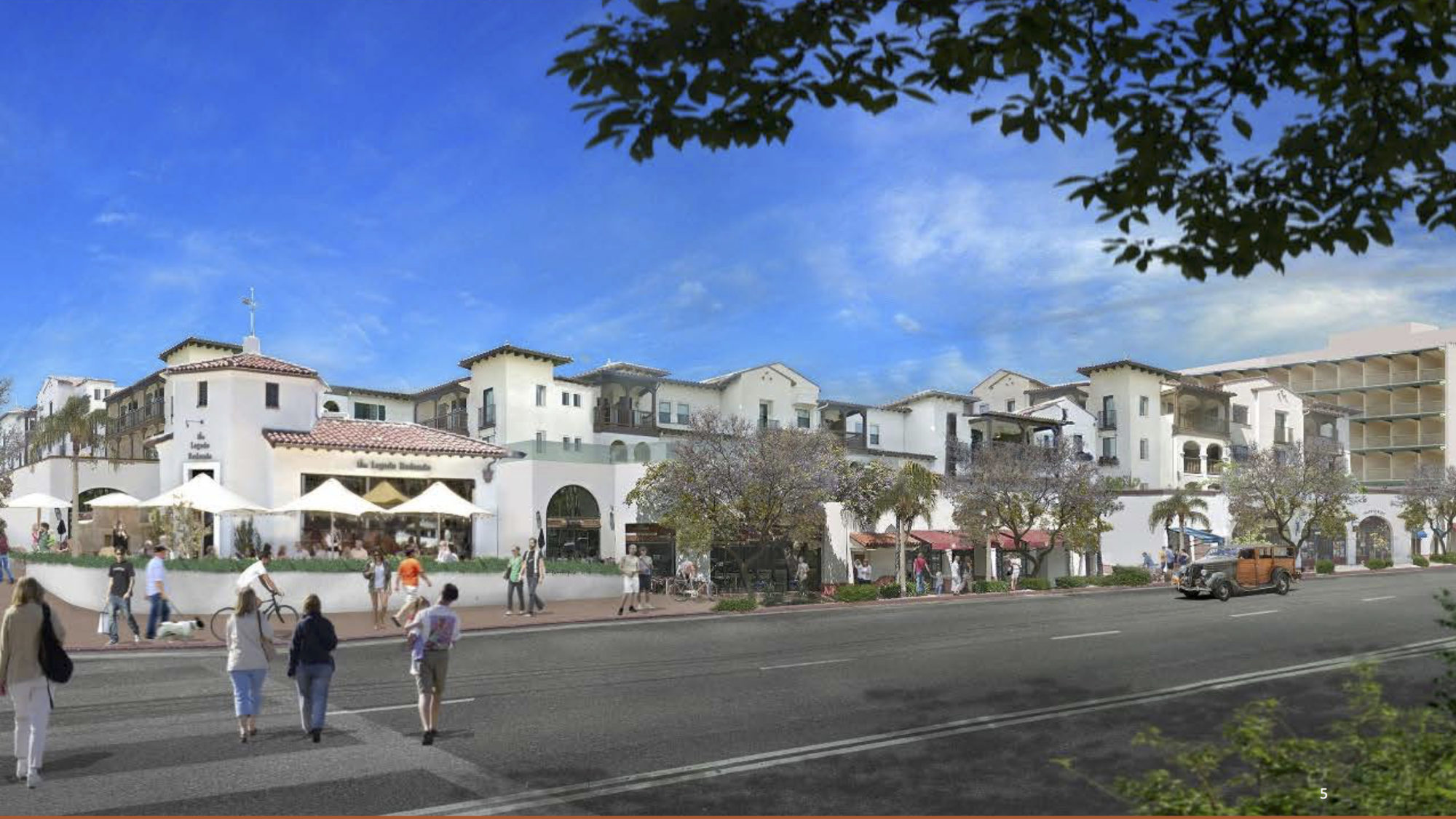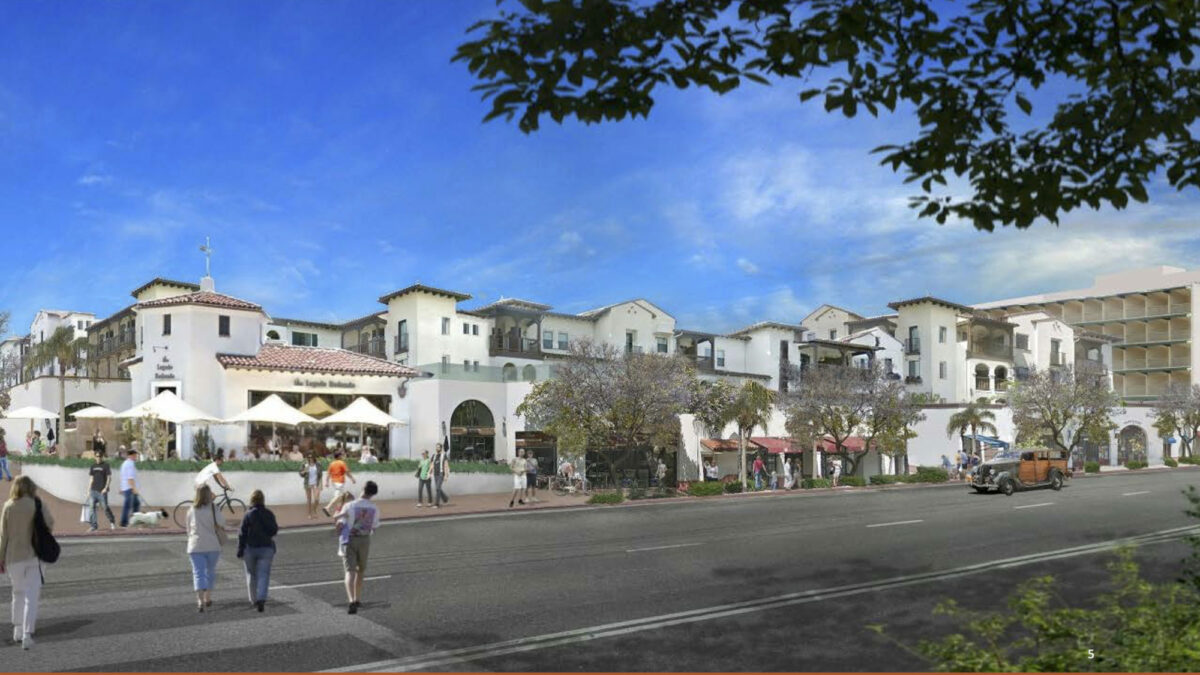
The City of Redondo Beach and mixed-use developer Legado will meet again in court, following a motion by Councilman Bill Brand that discarded a settlement agreement between the two.
Brand’s motion came at the end of a public hearing that was to determine the fate of a revised project put forth by the developer in accordance with a settlement agreement reached in December. The sticking point, in the end, was not the mixed-use project so much as it was the adjoining Palos Verdes Inn, which is also owned by Legado. PV Inn has been closed since mid-2015 as the result of a fire on the property.
“Because of [the Council’s] concern of the unknown regarding when the hotel would reopen, they chose the unknown of litigation,” City Attorney Michael Webb said.
The December agreement halted a lawsuit against the City while allowing Legado to submit a revised 115 residential unit, 23,529 commercial square foot project. Part of the agreement was that by reducing its commercial footprint, and hence traffic impacts, Legado would no longer be required to pay for and implement traffic mitigation measures.
Legado has long been at odds with Redondo Beach and Torrance residents over its Legado Redondo development, at the corner of Pacific Coast Highway and Palos Verdes Boulevard.
The mixed-use project has gone through a series of iterations since it first considered by the Redondo Beach Planning Commission in March 2015.
Originally proposed as a 180 unit, 36,000 commercial square foot project, Legado Redondo shrunk multiple times in accordance with pushback from the community and the city’s Planning Commission. By Nov. 2015, Legado submitted a 146 unit, 23,800 commercial square foot design, which was ultimately denied by the Planning Commission.
Legado then appealed to the Redondo Beach City Council, who ultimately approved a 115 unit, 23,800 commercial square foot project in June. The decision ran counter to a suggestion by Legado attorney Michael Shonafelt, who said the company would accept nothing less than their 146 unit proposal.
The Council’s June approval was of a motion proposed by Brand which stated that traffic mitigations at the PCH/PV Blvd. intersection must be complete, and hotel renovation plans must be submitted before Legado could even begin demolishing the current structures. His belief was that fewer residences would create less traffic, even as commercial space remained the same.
But then-District 1 Councilman Jeff Ginsburg — a property manager by trade — warned that Legado would still be able to build their residential project to the same dimensions, resulting in larger dwelling units over the same area. He also argued that Legado would sue over the decision.
Ginsburg was correct on both counts. Legado filed a civil suit against Redondo Beach in August, seeking entitlements for their original, 180 unit project. In December, the City announced a settlement that would put the lawsuit on hold and allow Legado to submit a revised 115 unit, 23,529 square foot project for review by the Council.
Brand’s issues with the project stem with the City’s existing Mixed-Use zoning, which allows for development of 35 residential units per acre.
“We shouldn’t be fighting this scale at the project level, we should be fighting it at the Mixed-Use zoning level,” Brand said Tuesday night. “The fault lies with this council. This council failed you.”
Brand then attempted to strike a finding in the resolution stating that the project was “in harmony with…surrounding properties.” He was deterred when Webb noted he and the rest of the council already approved that language last June.
Mayor Steve Aspel took issue with what he considered to be Brand’s political grandstanding.
“It was a bad motion that night, I thought…the council voted 3-2 to approve the project at 115 units, and you walked out of here with a win; you won the argument,” Mayor Steve Aspel said to Brand. “But it didn’t help kill the project and it also subjected us to that potential lawsuit.”
“If it was such a horrible motion, why didn’t you veto it,” Brand shot back.
“You were happy with it,” Aspel said.
As Webb said, Council essentially was making a choice between a smaller version of the project they approved last June, minus traffic mitigation at the nearby intersection, or a return to litigation.
Comments from the public seemed to have buyers’ remorse over the 2016 decision.
“I had high hopes for the concept at 115 units maximum, but essentially there is no reducing in mass from the 149 unit plan,” said Amy Josefek, who seethed at the council. “It seemed possible a new plan will not reduce the total population of the project, but accomplish the opposite.”
Other residents, however, grew concerned with Legado’s likelihood to renovate the Palos Verdes Inn. The settlement agreement with Legado required Legado submit hotel renovation plans before they can get their Certificate of Occupancy for the mixed-use project.
“I’m concerned that the hotel is going to continue to fall into further disrepair,” said Pamela Popovic. “I’ve lived in this area for many years…the PV Inn was a wonderful place for guests to go.”
Early in proceedings, Councilman Christian Horvath made a motion to approve the project and the agreement.
However, Brand was dissatisfied with the agreement, and substituted a motion to deny the project, which was seconded by Councilman Steve Sammarco. His belief was that further negotiations could hasten the hotel timeline.
“I think we’re very close, and I don’t think this is over,” Brand said. “Now we’re looking at two to three years before plans are even approved when it’s already been sitting there for over two years.”
Shonafelt disagreed.
“By taking this position, [Brand] is further delaying any hotel…it’s baffling to see you take that position and to see anyone joining in,” Shonafelt said. “That’s going to delay the hotel, I assure you. Litigation is glacially paced and very slow.”
Brand’s motion passed on a 3-2 vote. Brand, Sammarco and District 1 Councilwoman Martha Barbee voted in favor.
Unlike the June 2016 decision, which was met with applause from the audience in attendance, this decision seemed more in keeping with stunned silence.
Though Aspel’s mayoral powers do not offer him a vote, he is allowed by the City Charter to veto any council decision that is made by a 3-2 vote.
Brand asked Aspel if he was going to veto the council decision. The Mayor declined, allowing the motion to pass.
After the meeting, Barbee said that her vote came from listening to the residents of her district.
“I heard the concerns of the people I represent, and had to weigh the certainty of settling litigation versus giving up the certainty of what people want to see done [with the hotel,]” Barbee said. “We weigh the best interest of the city and its finances with the best interests of the community.”
The next step for the City, according to Webb, is returning to active litigation against Legado. The future for any potential settlements, he said, is cloudy.
“Not at this time,” Webb said. “They made clear their next step is litigation. [Approval of a settlement] would take another public hearing, though.”
Correction: This article has been edited to reflect that Christian Horvath initiated a motion to pass the agreement with Legado.










